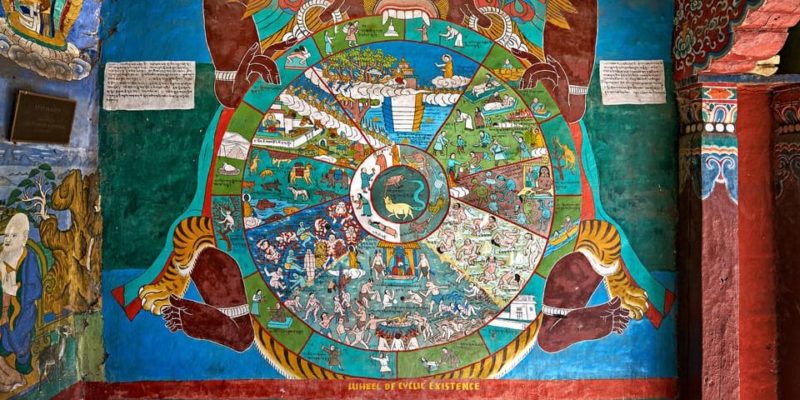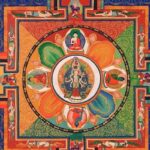We explain what religious knowledge is, characteristics and examples. Furthermore, its relationship with other types of knowledge.

What is religious knowledge?
Religious knowledge or religious knowledge is understood to be that which is based on an undemonstrable belief system. It serves as moral, ethical or emotional support for human behavior proposing its link with the sacred: God, divinity, the spirit, etc.
Generally this type of knowledge are organized around a specific creed collected in one or more mystical or sacred texts. They are guarded, taught and interpreted by religious institutions, such as the different churches and priesthoods that exist.
In general, this type of knowledge is inherited over several generations. For this reason, it houses an important cultural value and has served in different eras of humanity to organize the community morally, socially and even politically.
Furthermore, religious knowledge responds in its own way to a set of existential doubts and questions that humanity has had since its earliest times. In doing so, it can provide containment, tranquility and meaning to an existence that, for many, can feel empty or distressing, lacking final meaning.
In fact, much of the world's artistic and philosophical production has been influenced and motivated by religious knowledge. However, in many other cases, this type of knowledge can come into contradiction and even compete with rational type knowledge.
See also: Technical knowledge
Characteristics of religious knowledge
Religious knowledge, above all, is dogmatic: it is accepted or not, but lacks demonstrable logical arguments but it is sustained by faith. It proposes, in different ways, that human beings are the fruit of divine creation and that therefore we must worship the creator.
Consequently, imposes certain moral and ethical precepts, expressed as a doctrine. This may or may not be guarded and taught by a church: a social organization that aims to perpetuate a specific faith.
On the other hand, religious knowledge is put into practice through rituals and prayers, generally based on repetition and the forging of community ties between believers, so it is also serves as a social meeting point and the constitution of an organized “we”. In fact, many wars were fought in ancient times over imposing one faith over another.
Religious knowledge, then, is unquestionable and is governed by its own logic, which generally distinguishes between good and evil or between what is just and what is sinful, depending on the values that are expressed behind each religion. For example, Christianity is a doctrine of guilt, while the religion of ancient Greece was based on honor and balance.
Finally, religious knowledge It is usually collected in sacred books which can be a single or different volumes, and which usually mix the narrative with the ordinances, with the prayers and with the historical-religious account. The Bible, the Koran or the Talmud are examples of this.
Examples of religious knowledge

Any religious practice is a good example of knowledge of this type. For us the best known are catholic christian traditions with its saints and abundant hagiographic literature (on the lives of the saints), and with its New Testament.
On the other hand, there are also different Vedic traditions of India and Hinduism with its wheel of life, its Samsara and its circuit of reincarnations. We can also mention the African mysticism of Santería (Yoruba religion) in the Caribbean.
Relationship with other types of knowledge
In the West, philosophical tradition and religious thought have a common basis. This is because in Antiquity the distinction between religious thought and scientific or empirical thought did not exist, but they were all the same thing, often called Philosophy.
This trend continued for many centuries. In the European Middle Ages, the Christian faith prevailed over all discourses, even the philosophical one and predominated as a supreme value. Any question that contradicted the Christian faith was branded sinful and could result in its author being burned at the stake.
However, the secularization of society (for example, the break between State and Church) gave rise to the possibility of reason taking the place previously held by faith. That is to say that In the Modern Age, religious knowledge was displaced by scientific knowledge.
This change marked the end of the Middle Ages and the Ancien Regime and gave way to a modern world, guided by science and faith in human reason, rather than in divine designs. Thus, religion began to occupy a secondary, personal, almost intimate place in people's lives.
Other types of knowledge
Other forms of knowledge are the following:
- Scientific knowledge It arises from the application of the scientific method to the different hypotheses that arise from the observation of reality. These hypotheses must be demonstrated through experiments and ultimately aim to discover the laws that govern the universe.
- Empirical knowledge It can be obtained through direct experience, repetition or participation. It does not require an approach to the abstract, but rather arises from the things themselves.
- Philosophical knowledge It comes from human thought, in the abstract, by using various logical methods or formal reasoning. It does not always emerge directly from reality, but from the imaginary representation of what is real.
- Intuitive knowledge It is acquired without formal reasoning, quickly and unconsciously. It is usually the result of inexplicable processes.
Continue with: Theology
References
- “Religion” on Wikipedia.
- “2. Religious knowledge” in Gestiopolis.
- “Religious knowledge” in Cibertareas.info.
- “Religious knowledge, what is it?” in Ministers magazine.





